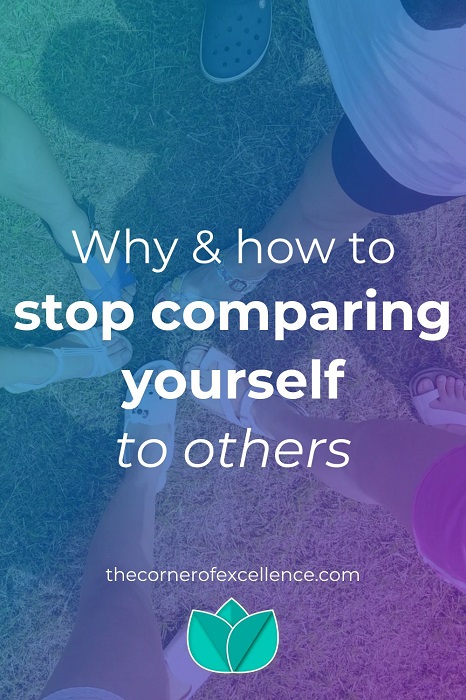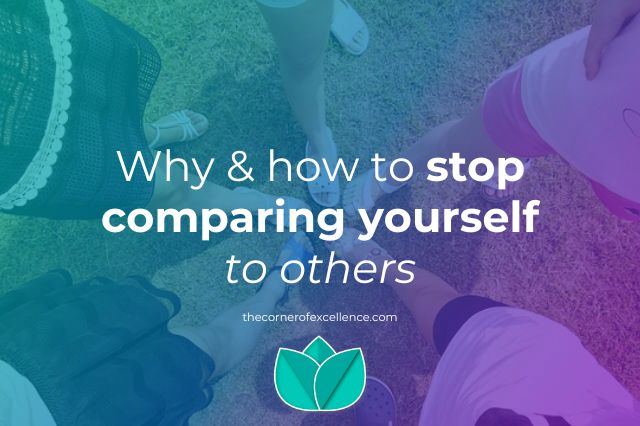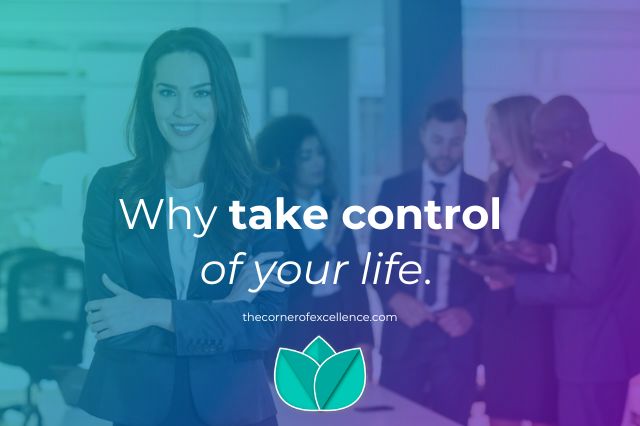It is natural to tend to compare yourself to others. But depending on the objective of our comparison, it can make us feel bad and damage our self-esteem. Let us see why we compare ourselves, when it does not do us well, and how to stop comparing ourselves to others if this is the case.
Why we compare ourselves
Comparing yourself to others is a way of evaluating how you are, your capabilities and points of view. How are you doing on a professional or personal level? What can you aspire to? Do your values, beliefs and opinions make sense? Comparing yourself reasonably and correctly can motivate you to develop and grow.
The social psychologist Leon Festinger studied in the 1950s social comparison and the reasons that lead us to it. According to him we have basically two reasons. On the one hand, reducing uncertainty about some aspects or areas of our life. On the other hand, learning to define ourselves. He said that we do not know how to define ourselves independently and intrinsically. We can only do it in relation to other people.
Festinger also found that the greater the difference between our opinions and capabilities and someone else’s, the less our tendency to compare ourselves to them. In other words, we tend to look more for the comparison with people who we consider to be at our level or in a similar situation.
The more important we consider a certain group of people, the more pressure we feel to measure our abilities and opinions compared to theirs and conform and adapt to resemble them.
How we compare to others
It is almost inevitable to compare yourself, at least at some point, with others. The question is how we make that comparison and for what purpose.
We tend to compare an aspect of ourselves that we feel insecure about or that we know can be improved. We compare it to what we see superficially in others. In other words, we compare with the image they project to the outside, be it in certain activities or on social media.
We take what little we perceive as the whole truth. We do not consider how that person got there, what their background and experiences are. Nor do we value ourselves, our experience, our achievements and capabilities.
In short, we do not usually compare on equal terms. That is why it is most likely that we will lose in the comparison, by weighing the worst of ourselves versus the best of others.
The effects of comparing yourself to others
Comparing ourselves to others often hurts our self-esteem. Comparing our weaknesses with the strengths of others can only make us feel bad and inferior.
Even if we compare a strength of ours with that of another person, we can only feel good, if we surpass the other in that strength. That leads to basing our self-esteem on quicksand. You can only feel good considering the other inferior. In addition, someone who is better than you in that regard can always show up. Then your self-esteem will sink.
These types of comparisons also tend to create envy and resentment towards others. You may feel the need to criticise them. In this way, you deny yourself the possibility of getting to know them better, of appreciating them and even admiring their qualities.
On the other hand, the need to feel superior to others can lead you to brag too much about your achievements, which will also not help you win the favour and sympathy of others.
Living worried about how good or bad we are compared to others consumes a lot of energy and valuable time that you could invest in more productive things. It creates unnecessary stress for you. It also prevents you from behaving authentically and expressing yourself freely.
Also keep in mind that a good comparison requires valid benchmarks and references. Comparing your inner and known aspects to what someone else appears to be cannot be a fair comparison. This is like comparing apples and oranges.

How to stop comparing yourself to others
Having seen why we compare ourselves and what effect it has on our self-esteem and well-being, let us see how to stop comparing.
When and why do you compare yourself?
First become aware of the situations in which you usually compare yourself. It may not be so easy if the habit is so ingrained that you do it often without realising. So try to pay attention to when you tend to compare yourself.
The second step is to consider the goal behind. What do you want to achieve with the comparison? Enhance yourself or evaluate your situation?
Evaluating vs. self-enhancing
Comparing ourselves can negatively affect our self-esteem in addition to stagnating our personal development. This happens when we compare ourselves to try to reaffirm our qualities and our ego. It can become an obsessive and toxic reflex. In addition, if we do not come out well in the comparison, we will surely experience envy, anger or shame.
Considering that it is human to compare yourself, it helps to change your approach. That means comparing yourself to assess your own situation and your abilities with a growth mindset. That is, to find out what aspects we should work on and what skills we should improve to achieve our personal or professional goals.
What do you get out of the comparison?
Ask yourself what you achieve when you compare yourself. Does it create discomfort, stress, envy, anger or shame? Therefore, does it help you to be a better person or does it rather limit you and make you feel worse about yourself? Realise that you are causing yourself pain that you could avoid.
Focus on yourself
Comparing yourself to others puts the spotlight on the wrong people. You can only change your own life and improve your own person. That is why it is better to focus on yourself and your own qualities.
Remember that you are unique. Remember your strengths, talents, abilities, qualities and achievements. Then think about what you want to improve, what strengths you want to enhance. To measure your progress, compare yourself to your previous version. It really is the only valid reference. If you want to compete against someone, let it be against yourself with the desire to excel and improve every day.

Focus on learning
Instead of comparing yourself and trying to compete with others, focus on developing yourself. Do not stop learning and improving as a person and professional. Reflect on what you would like to achieve and set goals to work towards them.
It is from mistakes and failures that most can be learned. Setbacks can help us grow personally and professionally.
Find a purpose
When we feel that we have a purpose, when we work on projects that fulfill us, and when we have interests and hobbies that we enjoy, we feel more satisfied. Then there is little place, time and interest to compare yourself to others. We feel like we have more important things to do with our time.
Accept imperfection
Behind the urge to continually compare yourself may be a desire to achieve perfection. That is to say, on the one hand, believing that others have a perfect life, a perfect appearance, they do this or that perfectly. On the other hand, believing that you must be perfect and aspiring to achieve that perfection in which you think others live.
Realise that perfection is an illusion. Nobody is perfect. Furthermore, perfectionism creates a lot of pressure and stress. It is one thing to value your strengths and be proud of them and to always try to give your best. It is another thing to put yourself under the constant pressure to try to be perfect. You will live more relaxed and at ease with yourself if you accept that perfection is impossible to achieve. What is more, don’t you think the world would be a boring place if we were all perfect?
Review your use of social media
Social media has increased our social circle and with it also social comparison. They have become a means to present our best side and the best that happens (supposedly) in our life. Social media is full of perfect faces, perfect bodies, people with super healthy habits, and fun and interesting lives that make you envious. They seem to have a perfect life and no problems or concerns.
But this is not the only content that can be found on social media. That is why I suggest that you review what you consume and how it makes you feel. Anything that makes you feel bad or inferior, I suggest you stop following and consuming.
I take this opportunity to invite you to consider how many times a day you use social media and for what purpose. To distract yourself when you feel bored? Maybe you want to consider doing a digital detox.
Catch yourself red-handed
I said before that the habit of comparing yourself can be deeply ingrained. To lose that bad habit and stop comparing yourself, perhaps the trick of saying “stop” every time you catch yourself in the act can help.
Look at the positive things
If you put your attention on the positive things, be they good things that happen to you or positive aspects of yourself or others, you will feel more satisfied. Savouring good times and good memories as well as practicing gratitude helps cultivate a more positive attitude. Satisfied and grateful people are not usually envious. They feel comfortable with themselves and have better self-esteem.
Practice mindfulness
Finally I suggest that you introduce mindfulness in your life. Learning to be present, practicing meditation or contemplation increases your self-knowledge, self-acceptance, compassion and kindness towards yourself and others as well as your level of patience. This reduces the need to look for unproductive distractions and to compare yourself to others.
Will you stop comparing yourself to others?
Constantly comparing yourself to others offers you little gain but much to lose. Comparisons tend not only to rob you of your self-esteem, but also of valuable time and energy that you could use in more productive ways.
Comparing can even damage your social relationships, distancing you from friends, family, colleagues and acquaintances or creating conflicts with them.
Do you often compare yourself? With what objective? How does it usually make you feel? After reading this post, will you try to make any changes and, if so, which?

Sharing is caring!





